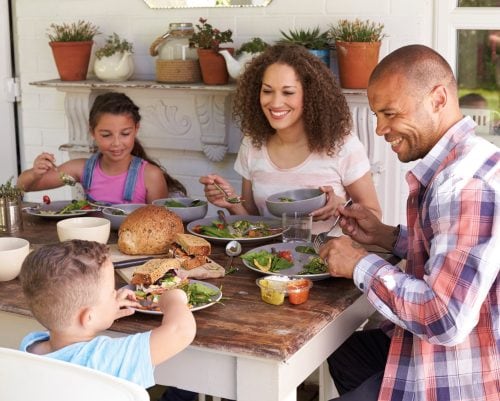
Dietitian Anna Small offers easy tips to make family mealtimes healthier and happier.
Eating meals together is associated with long-term health benefits, including strong family relationships and healthy eating habits. But, whether it’s music lessons, sports practice or work deadlines, in this fast-paced world many of us feel too busy to participate in the ‘old-fashioned’ family meal. How do we make space to dine together on top of all our family’s commitments?
Make it a priority
Begin by realising that it is possible. Identify the barriers currently preventing you from having family mealtimes and take steps to overcome these. Aim to eat together for at least one meal a day, whether it is breakfast, lunch or dinner. If weekdays are too busy, consider a traditional weekend meal, for example Saturday brunch or Sunday roast.
Plan ahead
Set a regular time for family meals and mark them on the calendar so everyone knows when to be home. If schedules vary, identify which nights work best. Shop in advance and consider doubling recipes to freeze for days when you know you’re going to be really busy. Slow cookers are fantastic on busy days.
Download the Healthy Food Guide weekly meal planner
Remove distractions
Mealtimes are a perfect opportunity to catch up on the highlights and challenges of everyone’s day and how they are feeling. When technology becomes the focus, rather than family, nutrition or communication, the benefits of family meals are lost. So, turn that television off, put your phones away and focus on your meal and each other.
Keep communication positive
Try to avoid lecturing or disciplining. With younger ones, aim to focus on positive eating behaviour and avoid being restrictive or coercive about food.
Be a role model for your children
This is an excellent time to model appropriate table manners and help your children explore new foods. Keep meals balanced with a selection of vegetables. Positive role modelling is more likely to influence your children than telling them what or how to eat.
Eat at the table
Not only is it easier to communicate when you are facing each other, it’s also a lot easier to focus on your meal. If you don’t all fit at the table, or you haven’t got one, try to sit in the same area where you can eat comfortably and see each other, for example have a picnic in the living room.
Involve all family members
Work together to produce a meal. This strengthens relationships and helps teach children skills they’ll use for life. Children can set the table, choose a candle or table decoration, choose condiments or help with food preparation and clean up.
Avoid drive-throughs
When eating out, try to avoid drive-throughs and instead eat your meal inside the restaurant with your family. This way, you are still eating together and able to communicate around a table face-to-face. This may also help you relax after that busy day that has kept you out late. Takeaways do not have to be unhealthy. Consider water with meals rather than fizzy drinks and keep portions similar to what you would eat at home.
The benefits of eating together
Studies show children who eat meals with their families tend to eat more fruit, vegetables and fibre, and fewer processed foods and soft drinks than those who don’t. This alone is a fantastic reason to eat together as a family, but what other benefits are there?
For the younger kids
When family mealtimes involve positive communication and discussion about food, research suggests, children will be willing to try new foods more often than if told to eat everything on the plate. It is important to remember it can take up to 12 times before a child will accept a new food. Try introducing a new food along with some of their favourites, and make sure everyone at the table has the new food on their plate.
For the older kids
A study of New Zealand secondary school students linked frequent family meals with stronger family relationships and better communication, and reduced risk of mental illness, suicide and substance abuse.
For everyone
Restaurant or takeaway meals are often larger than homemade meals, which can lead to overeating and weight gain. As well as this, homemade meals are not usually deep fried or highly salted so are usually healthier.
Eating meals together as a family may seem like a difficult and unlikely task, but it is worth it. With a little planning and practice, you and your family can experience the many health benefits that will stay with you and your children throughout life.
Article sources and references
- between children’s diet quality and watching television during meal or snack consumption: A systematic review. Maternal & Child Nutrition DOI:10.1111/mcn.12428https://onlinelibrary.wiley.com/doi/full/10.1111/mcn.12428
- Fortune S et al. 2010. Youth ’07: The health and wellbeing of secondary school students in New Zealand: Suicide behaviours and mental health in 2001 and 2007. Auckland: The University of Auckland.https://www.fmhs.auckland.ac.nz/assets/fmhs/faculty/ahrg/docs/2007-suicide-behaviour-report.pdf
- Martin-Biggers J et al. 2014. Come and get it! A discussion of family mealtime literature and factors affecting obesity risk. Advances in Nutrition 5:235-47https://www.ncbi.nlm.nih.gov/pubmed/24829470
- Ministry of Health. 2012. Food and Nutrition Guidelines for Healthy Children and Young People (Aged 2–18 years): A background paper. Partial revision February 2015. Wellington: Ministry of Healthhttps://www.health.govt.nz/system/files/documents/publications/food-nutrition-guidelines-healthy-children-young-people-background-paper-feb15-v2.pdf
- Neumark-Sztainer D et al. 2003. Family meal patterns: Associations with sociodemographic characteristics and improved dietary intake among adolescents. Journal of the Academy of Nutrition and Dietetics 3:317-22https://www.ncbi.nlm.nih.gov/pubmed/12616252
- Utter J et al. 2008. Relationships between frequency of family meals, BMI and nutritional aspects of the home food environment among New Zealand adolescents. International Journal of Behavioral Nutrition and Physical Activity 5:50https://www.ncbi.nlm.nih.gov/pmc/articles/PMC2579296/
- Utter J et al. 2013. Family meals and the well-being of adolescents. Journal of Paediatrics and Child Health 49:906-11https://onlinelibrary.wiley.com/doi/abs/10.1111/jpc.12428
www.healthyfood.com










